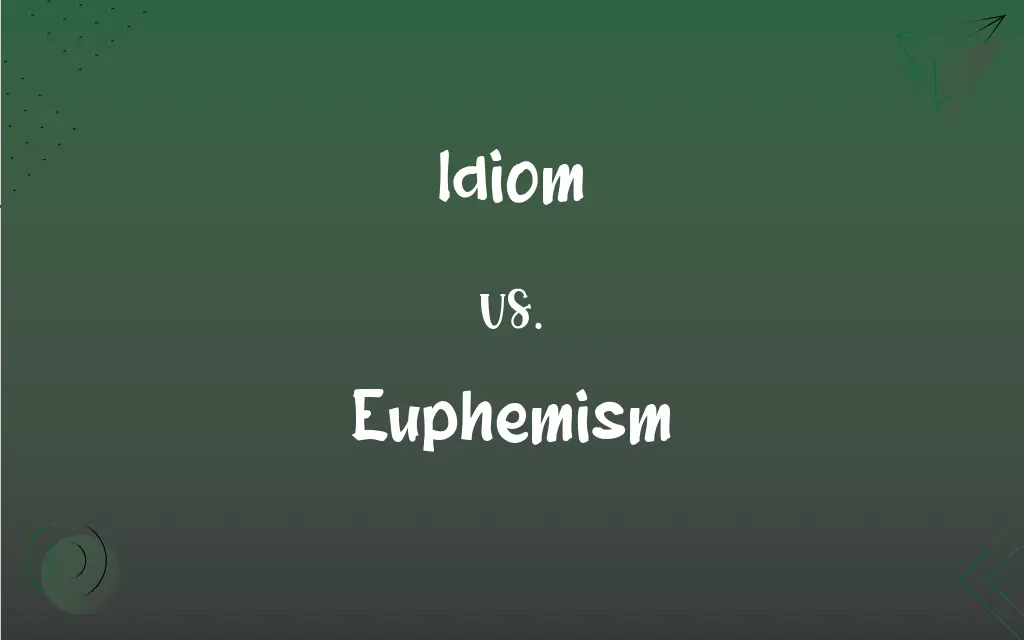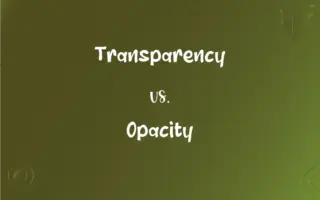Idiom vs. Euphemism: What's the Difference?
Edited by Aimie Carlson || By Janet White || Updated on November 13, 2023
An idiom is a phrase with a figurative meaning different from its literal meaning, while a euphemism is a polite or mild word or phrase used to replace a harsher or more direct one.

Key Differences
Idioms are expressions with meanings that cannot be inferred from the meanings of the individual words. While, euphemisms are used to soften or obscure the reality of a topic, often to be polite or sensitive.
Idioms add color and cultural uniqueness to language, often puzzling to non-native speakers. Whereas, euphemisms serve a social function, making uncomfortable topics more palatable.
Idioms reflect cultural idioms and practices. However, euphemisms evolve with societal attitudes towards taboo or sensitive subjects.
Idioms can be challenging to learn as their meanings are not literal. On the other hand, euphemisms require understanding of context and social norms.
Idioms vary widely across languages and cultures. Euphemisms change over time as societal attitudes shift.
ADVERTISEMENT
Comparison Chart
Primary Function
Convey figurative meaning
Soften or replace direct language
Usage
Cultural expressions, non-literal
Politeness, sensitivity in language
Context
Adds color to language
Addresses sensitive or taboo topics
Learning
Requires understanding of cultural context
Dependent on social norms and attitudes
Variability
Differs across cultures
Changes with societal attitudes
ADVERTISEMENT
Idiom and Euphemism Definitions
Idiom
Expressions unique to a culture or language.
‘Kick the bucket’ is an idiom for dying.
Euphemism
Phrases that make harsh realities more socially acceptable.
‘Economically disadvantaged’ for poor.
Idiom
Commonly used phrases in informal language.
Saying ‘barking up the wrong tree’ means pursuing the wrong course.
Euphemism
Avoiding direct reference to unpleasant realities.
Using ‘big boned’ instead of ‘overweight’.
Idiom
Phrases whose meanings are often lost in translation.
‘Under the weather’ means feeling ill.
Euphemism
Language used to be more polite or less blunt.
‘Let go’ instead of ‘fired’ from a job.
Idiom
A phrase meaning something different from its literal words.
Spilling the beans means revealing a secret.
Euphemism
Terms used for discussing sensitive or taboo subjects.
‘Between jobs’ for unemployed.
Idiom
Language where words mean more than their literal meaning.
‘Break a leg’ in theater means ‘good luck’.
Euphemism
A mild or indirect word or expression.
‘Passed away’ is a euphemism for dying.
Idiom
A speech form or an expression of a given language that is peculiar to itself grammatically or cannot be understood from the individual meanings of its elements, as in keep tabs on.
Euphemism
A mild, indirect, or vague term for one that is considered harsh, blunt, or offensive
"Euphemisms such as 'slumber room' ... abound in the funeral business" (Jessica Mitford).
Idiom
The specific grammatical, syntactic, and structural character of a given language.
Euphemism
The use of such terms
"Euphemism is common in hospital and medical facilities where bodily functions need to be discussed" (Diane F. Halpern).
Idiom
Regional speech or dialect.
Euphemism
(uncountable) The use of a word or phrase to replace another with one that is considered less offensive, blunt or vulgar than the word or phrase which it replaces.
Euphemism
(countable) A word or phrase that is used to replace another in this way.
Euphemism
A figure in which a harsh or indelicate word or expression is softened; a way of describing an offensive thing by an inoffensive expression; a mild name for something disagreeable.
Euphemism
An inoffensive expression that is substituted for one that is considered offensive
FAQs
Can idioms be translated literally?
No, their meanings often get lost in literal translation.
Why are euphemisms used?
To address sensitive or uncomfortable topics more gently.
Are idioms universal?
No, they often vary significantly across languages and cultures.
What is a euphemism?
A mild or indirect word used to replace a more direct or harsh one.
How do euphemisms reflect society?
They change with societal attitudes towards certain topics.
How are idioms learned?
Usually through cultural immersion and practice.
What is an idiom?
A phrase with a figurative meaning different from its literal words.
Do idioms have direct meanings?
No, their meanings are figurative, not literal.
Can euphemisms evolve over time?
Yes, as societal norms and sensitivities change.
Do idioms exist in all languages?
Most languages have their own unique idioms.
Can euphemisms be misleading?
Sometimes, as they can obscure the true meaning.
Are euphemisms always polite?
Typically, though context and usage can vary.
Is it necessary to use euphemisms?
In sensitive or formal contexts, they are often preferred.
Can idioms change in meaning?
Their usage might evolve, but meanings generally remain constant.
Why are idioms important in language?
They add cultural uniqueness and color to language.
Can idioms be confusing to non-native speakers?
Yes, without understanding the cultural context.
Why might someone avoid euphemisms?
For clarity or to address issues more directly.
Are idioms used in formal writing?
Generally, they are more common in informal language.
What's an example of a euphemism in business?
‘Downsizing’ instead of ‘layoffs’.
How do euphemisms affect communication?
They can soften the impact of what is being communicated.
About Author
Written by
Janet WhiteJanet White has been an esteemed writer and blogger for Difference Wiki. Holding a Master's degree in Science and Medical Journalism from the prestigious Boston University, she has consistently demonstrated her expertise and passion for her field. When she's not immersed in her work, Janet relishes her time exercising, delving into a good book, and cherishing moments with friends and family.
Edited by
Aimie CarlsonAimie Carlson, holding a master's degree in English literature, is a fervent English language enthusiast. She lends her writing talents to Difference Wiki, a prominent website that specializes in comparisons, offering readers insightful analyses that both captivate and inform.































































